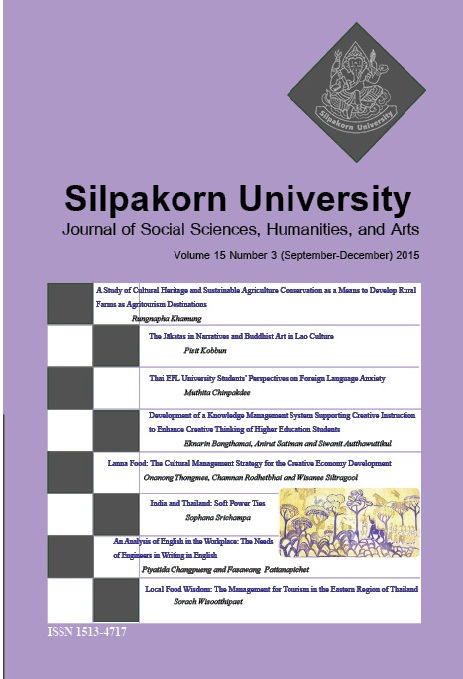Lanna Food: The Cultural Management Strategy for the Creative Economy Development
Main Article Content
Abstract
The study of local wisdom for the production and development of Lanna food, a reference to local food of the upper northern region of Thailand, provides great benefits towards the creative economy and sustainable business, and also promotes conservation of Lanna food. This research aims to (1) study the history and the culture of Lanna food (2) study problems and solution guidelines of Lanna food, and (3) study the cultural management of Lanna food in order to develop the creative economy. A qualitative research method was applied in this research, with the districts in Chiang Mai Province as target areas, namely: Mueang, Fang, Chiang Dao, San Pa Tong, Hang Dong, Mae Taeng, Doi Lo, Phrao, Doi Saket, Mae Wang, Wiang Haeng, and San Sai. The research instruments of this study, employed in field data collection from key informants, casual informants, and general informants, included interview, observation, focus group discussion, and workshops. Documentary approach was also used to collect data. In terms of the verification of the aforesaid data, triangulation method was used, while a review of descriptive data analysis was chosen as a means of the presentation of research findings. In terms of the guidelines for the cultural management of Lanna food to develop the creative economy, it was found that the producers coped with the cultural management of Lanna food as follow. Producers should select the products and participate in the OTOP Product Champion (OPC) campaign which held every two years, in order to maintain quality and standard of the products. Apart from that, a creative economy framework should be applied in order to develop the creative economy which consists of local wisdom, the Lanna food identity, appropriate technology, and distinctive services with the application of outstanding package design that would help increasing the value and prices of the products. This would contribute to job creation, competitive competence and healthy consumption. All in all, these practices would improve Lanna food as a means to create job opportunities, provide a stable income, and develop a creative economy in the community. In conclusion, Lanna food contributes to the creative economy of the community
and the country. Therefore, both the public and private sectors should recognize its importance and promote Lanna food by means of academic and financial support in order to ensure the cultural conservation and effective management for the sustainability of Lanna food.
Downloads
Article Details
All rights reserved. Apart from citations for the purposes of research, private study, or criticism and review,no part of this publication may be reproduced, stored or transmitted in any other form without prior written permission by the publisher.
References
Community Development Department. (2012) OTOP Product Champion: OPC (การคัดสรรสุดยอดหนึ่งตําบล หนึ่งผลิตภัณฑ์ไทย). [Online URL: https://www.cdd.go.th/download/551107_3.pdf] accessed on October 10, 2012.
Kalamsiri, P. Local Wisdom of Food : A Case Study of Taonor Village in Sila Sub-District, Muang District of Khon Kaen Province (ภูมิปัญญาพื้นบ้านด้านอาหาร: กรณีศึกษา หมู่บ้านเต่านอ ตําบลศิลา อําเภอเมือง จังหวัดขอนแก่น). Dissertation, Khon Kaen University, Khon Kaen, Thailand.
Kotler, P. (2000) Marketing Management, 11th ed., Upper Saddle River, NJ: Prentice-Hall.
Saiwichian, P. (2004) Food, Culure, and Health (อาหาร วัฒนธรรมและสุขภาพ). Department of Home Economics, Faculty of Education, Chiang Mai University. Chiang Mai: Nopburi Printing.
Santasombat, Y. (2005) Man and Culture (มนุษย์กับวัฒนธรรม), 3rd ed., Bangkok: Pimdee Co., Ltd.
Seibert, S. E. (1994) Social Interaction, Cross Functional Integration and Project Performance in the New Product Development Process. Dissertation Abstract International 55(5): 1320-A.
Thongkon, W. (2005) Factors Affecting Success According to Goals of One Tambon One Product Program of OTOP Group in Ratchaburi Province (ปัจจัยที่ส่งผลต่อความสําเร็จตามเป้าหมายของโครงการ หนึ่งตําบล หนึ่งผลิตภัณฑ์ ของผู้ผลิต OTOP ในเขตพื้นที่จังหวัดราชบุรี). Disserta-tion, Faculty of Humanities and Social Science, Nakhon Pathom Rajabhat University, Thailand.


